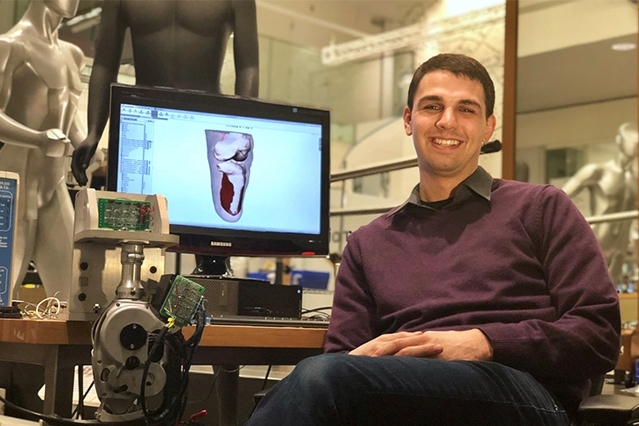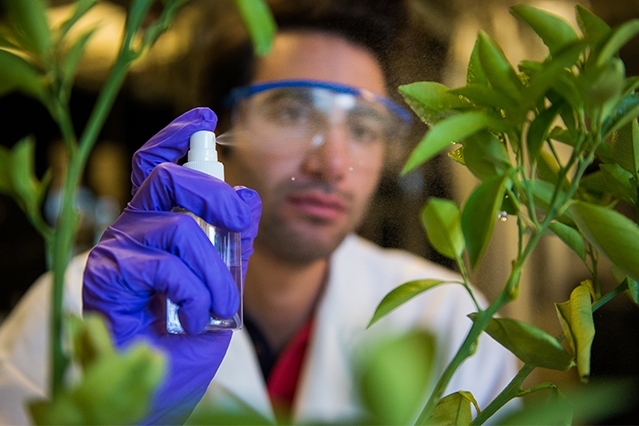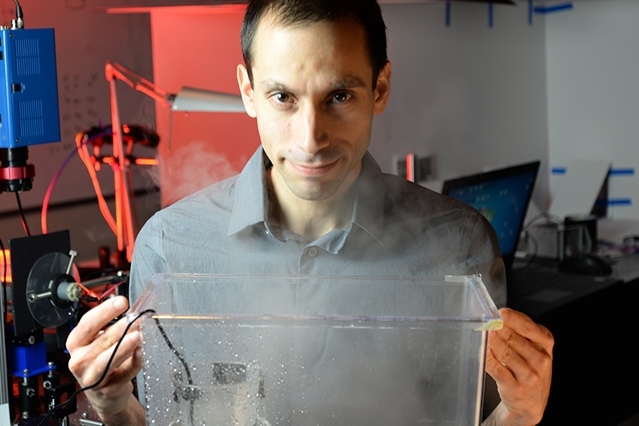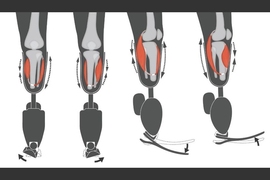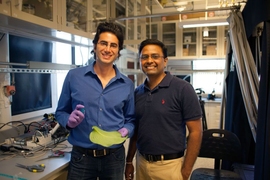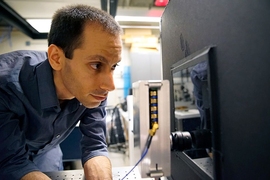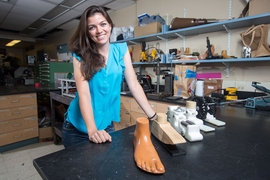MIT graduate students Tyler Clites, Maher Damak, and Guy Satat are among 14 collegiate inventors awarded the 2018 Lemelson-MIT Student Prize, which recognizes young inventors who have designed and built prototypes in the fields of health care, transportation and mobility, food/water and agriculture, and consumer devices.
The Lemelson-MIT Program awarded a total of $80,000 in prizes this year to six groups of undergraduate and graduate students nationwide. Winners were chosen based on the overall inventiveness of their work, the invention’s potential for commercialization or adoption, and youth mentorship experience.
“This year’s Lemelson-MIT Student Prize winners are the embodiment of the inventive spirit,” said Stephanie Couch, executive director of the Lemelson-MIT Program. “They have not only invented solutions to real-world problems, they are also paving the way for their peers through their mentorship. We’re excited to share their accomplishments and to continue seeing them grow as Lemelson-MIT winners.”
Tyler Clites — “Cure it!” Lemelson-MIT Student Prize
Tyler Clites is a PhD student in the Harvard-MIT Program in Health Sciences and Technology and is part of the Biomechatronics group at the MIT Media Lab. He developed a new approach to amputation called the Agonist-antagonist Myoneural Interface (AMI), which comprises a novel surgical technique for limb amputation and a complementary prosthetic control system. The AMI provides patients with proprioception, or the sense of the relative positioning of their prosthetic body parts in space. AMI was designed to allow people with amputations to receive feedback of joint position, speed, and torque from their brain-controlled prosthetic limb, improving their ability to perform everyday tasks and enabling them to feel as though their prosthesis is truly a part of their body.
Clites’s passion for teaching and mentorship has become a large part of his life. He has served as the head teaching assistant for Human 2.0, a lecture series and project course at the MIT Media Lab that explores cutting-edge research in the space of human augmentation. Clites also serves as a guest lecturer for various undergraduate courses at MIT and Harvard, and mentors undergraduate researchers at MIT and surrounding schools.
Clites plans to continue inventing throughout his career. His long-term professional goals are to become a professor and a researcher, invent imminently-translatable clinical solutions and establish a research environment where inventiveness and mentorship are held in the highest esteem.
Mahar Damak — “Eat it!” Lemelson-MIT Student Prize
Maher Damak, a PhD student in the Varanasi Research Group in the Department of Mechanical Engineering, developed a polymer additive for agricultural sprays so that pesticides stick to the plants instead of bouncing off. Currently, when farmers spray their fields with pesticides, only 2 percent of the spray sticks to the plants. The majority of the pesticides bounce off the plants and seep into the soil, ground water, and surface water, contaminating the environment. Damak’s invention is both biocompatible and biodegradable.
Recognizing the need for a support network of peers from his home country, Damak founded Tunisia@MIT to strengthen the cultural bonds of the Tunisian community. He also works with high school students in Tunisia who are considering applying to U.S. colleges and has served as an Undergraduate Research Opportunities Program mentor to undergraduate students at MIT.
Damak is passionate about the water-food-energy nexus. After graduating, he plans to pursue an entrepreneurial path to bring his inventions to market. He has already co-founded a company, Infinite Cooling, which will commercialize another invention of his, a water recovery process intended to bring greater efficiency to the way that power plants use water.
Guy Satat, “Drive it!” Lemelson-MIT Student Prize
Guy Satat, a PhD student in the Camera Culture group at the MIT Media Lab, developed All Photons Imaging, a system that captures clear images through dense fog for improved driving conditions. All Photons Imaging leverages the different light paths created by fog to reconstruct images as if the fog were not there, using a pulsed laser and an ultrafast Single Photon Avalanche Diode (SPAD) camera.
Satat is dedicated to mentoring undergraduate and master’s students at MIT. His most rewarding mentorship experiences as a graduate student were three trips to Mumbai, India, funded by his MIT Tata Center fellowship, where he led small groups of undergraduate students on several health-tech related projects. On his entrepreneurial path to commercialization, Satat recently filed a provisional patent application for All Photons Imaging.
Clites, Damak and Satat each received $15,000 for their inventive work.
Other 2018 Lemelson-MIT Student Prize winners include:
- Melissa Austin, Eric Cao, Talia Kirschbaum, Theodore Lee, and Harrison Nguyen of Johns Hopkins University, who are $10,000 undergraduate team winners. Their invention, N-Stent, is a comfortable and discreet nasal dilator designed to improve breathing for those who suffer from nasal obstruction.
- Kayla Nguyen of Cornell University, a $15,000 graduate winner. Nguyen invented the EMPAD, a fast, highly-efficient detector that enhances imaging for a range of microscopic applications.
- Kali Barnes, Stephanie Cai, Akash Chaurasia, Conan Chen, and Eric Chiang, of Johns Hopkins University, who are $10,000 undergraduate team winners. This team developed Treyetech, a device to help surgeons successfully perform corneal transplant surgery.
More information about all of this year’s collegiate prize winners are available on the Lemelson-MIT website.
The Lemelson-MIT Student Prize is open to teams of undergraduates and individual graduate students from any college or university in the United States who have inventions in categories that represent significant sectors of the economy: health care, transportation and mobility, food/water and agriculture, and consumer devices. Students interested in applying for the 2019 Lemelson-MIT Student Prize can find more information on the Lemelson-MIT website.
